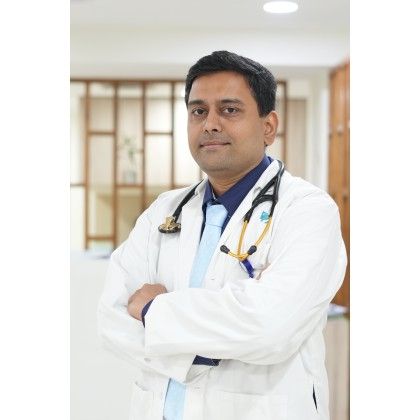Your Heart’s Gatekeepers; A Guide to Heart Valve Disease and Awareness
Learn about Heart Valve Disease Awareness, why it matters, symptoms to watch for, diagnosis, treatments, and how you can raise awareness to protect heart health.

Written by Dr. M L Ezhilarasan
Reviewed by Dr. J T Hema Pratima MBBS, Fellowship in Diabetes Mellitus
Last updated on 13th Jan, 2026

Introduction
Your heart has four tiny, but mighty, gatekeepers: its valves. They open and shut over 100,000 times a day, ensuring blood flows in the right direction. But what happens when these crucial structures falter? Heart valve disease affects millions, yet its symptoms are often dismissed as normal signs of ageing. It is important to listen to our hearts and understand this common but under-recognised condition. This comprehensive guide will walk you through everything you need to know—from identifying the subtle symptoms of a leaky heart valve to exploring modern minimally invasive heart valve surgery options. Our goal is to empower you with knowledge, because when it comes to valve disease, awareness can be the first step towards saving a life.
Understanding the Basics: What is Heart Valve Disease?
Heart valve disease occurs when one or more of the heart's four valves don't function properly. This can disrupt the smooth, one-way flow of blood through the heart chambers to the rest of the body, forcing the heart to work harder.
The Four Valves and Their Vital Roles
Think of the heart as a four-chambered pump. The four valves are:
Tricuspid Valve: Manages blood flow between the right atrium and right ventricle.
Pulmonary Valve: Controls blood flow from the right ventricle to the pulmonary arteries (to the lungs).
Mitral Valve: Manages blood flow between the left atrium and left ventricle.
Aortic Valve: The main valve controlling oxygen-rich blood flow from the left ventricle to the aorta and the entire body.
Main Types of Valve Problems: Stenosis and Regurgitation
There are two primary dysfunctions:
Stenosis: This occurs when a valve opening becomes narrowed or stiffened, preventing it from opening fully. This obstructs blood flow, like a sticky door that won't open all the way. Aortic stenosis is a common and serious form of this.
Regurgitation (or Insufficiency): This happens when a valve doesn't close tightly, allowing blood to leak backward. This is often called a leaky heart valve. It forces the heart to re-pump the same blood, making it less efficient.
Don't Ignore the Signs: Recognising Symptoms of Valve Disease
Many people live with mild valve disease for years without symptoms. However, as the condition progresses, signs will appear. It's easy to mistake these for less serious issues, so paying attention is key.
Common Symptoms (Shortness of Breath, Fatigue, Swelling)
The most common symptoms include:
Shortness of breath, especially when being active or lying down flat.
Unusual fatigue or weakness during everyday activities.
Dizziness, lightheadedness, or fainting.
Chest pain or palpitations (a feeling of a rapid, fluttering heartbeat).
Swelling of your ankles, feet, or abdomen.
If you experience persistent shortness of breath or chest pain, it is crucial to seek professional evaluation. If these symptoms are new or worsening, consult a doctor online with Apollo24|7 for further evaluation to determine if a heart issue is the cause.
Consult a Cardiologist for Personalised Advice
When Symptoms are Silent: The Importance of Screening
Often, the first sign of valve disease isn't a symptom at all—it's a sound. A doctor may hear a heart murmur (an extra whooshing or swishing sound) through a stethoscope during a routine exam. This is why regular check-ups are essential, especially for adults over 65. A murmur can be innocent, but it can also be the only clue to a significant underlying valve problem that requires monitoring or treatment.
Who is at Risk? Key Factors for Heart Valve Disease
While valve disease can affect anyone, certain factors significantly increase risk.
Age-Related Wear and Tear (Degenerative Valve Disease)
The most common cause is simply age. Over time, calcium deposits can build up on the valves, causing them to stiffen (stenosis) or fail to close properly. This is why the prevalence of conditions like aortic stenosis rises sharply after the age of 65.
Congenital Defects and Other Medical Conditions
Congenital Defects: Some people are born with malformed valves, such as a bicuspid aortic valve (having two leaflets instead of three).
Other Conditions: A history of rheumatic fever (much less common today), endocarditis (an infection of the heart lining), coronary artery disease, heart attack, or radiation therapy to the chest can all damage heart valves.
How is Heart Valve Disease Diagnosed?
Diagnosis typically begins in a doctor's office and may progress to more specialised tests.
The Stethoscope and The Murmur: Often the First Clue
As mentioned, the diagnostic journey often starts when a physician detects a murmur during a physical exam. This simple, non-invasive tool is incredibly powerful for initial screening.
Advanced Diagnostic Tools: Echocardiograms and Beyond
The definitive test for diagnosing valve disease is an echocardiogram (an "echo"). This ultrasound of the heart provides detailed moving pictures of the valves, showing their structure, movement, and the flow of blood through them. Other tests might include an electrocardiogram (EKG), chest X-ray, cardiac MRI, or a cardiac catheterisation to get more detailed information, especially if treatment is being planned.
Modern Treatment Options for Heart Valve Disease
Treatment depends on the valve affected, the type and severity of the disease, and the patient's symptoms and overall health.
Monitoring and Medication Management
For mild cases, the best approach may be "watchful waiting." This involves regular monitoring with echocardiograms to see if the disease progresses. Medications cannot fix a damaged valve, but they can help manage symptoms and reduce strain on the heart by controlling blood pressure, regulating heart rhythm, or removing excess fluid from the body.
Surgical and Minimally Invasive Procedures (TAVR)
When a valve is severely damaged and causing symptoms, repair or replacement is necessary.
Surgical Repair or Replacement: This is traditional open-heart surgery to either fix the patient's own valve or replace it with a mechanical or biological (tissue) valve.
Transcatheter Aortic Valve Replacement (TAVR): This is a revolutionary minimally invasive heart valve surgery procedure for patients with aortic stenosis who are at high or intermediate risk for open-heart surgery. A new valve is delivered via a catheter through a blood vessel in the leg or a small incision in the chest, then expanded inside the old valve. It's a life-changing option with a faster recovery time.
If your condition is diagnosed and requires intervention, specialists can discuss all treatment pathways with you, including the latest advancements like TAVR.
Living Well with Heart Valve Disease: Management and Outlook
Heart valve disease may be common, but with awareness, timely diagnosis, and modern treatment options, its impact can be greatly reduced. By recognising early symptoms and prioritising regular check-ups, we can protect our heart’s vital gatekeepers before complications arise. Advances like minimally invasive procedures have transformed outcomes, allowing many to live long and active lives. Let's commit to spreading knowledge and encouraging loved ones to listen to their hearts—because awareness truly has the power to save lives.
Consult a Cardiologist for Personalised Advice
Consult a Cardiologist for Personalised Advice

Dr. Prashant Adeppa
Cardiologist
10 Years • MBBS, MD General Medicine, DM Cardiology (Armed Forces Medical College)
Bengaluru
Apollo Hospitals Bannerghatta Road, Bengaluru

Dr. Nirmal Kolte
Cardiologist
8 Years • MBBS MD (Medicine) DM (Cardiology)
Nashik
Apollo Hospitals Nashik, Nashik
Dr. Praveen Jaiswal
Cardiologist
17 Years • MD(Medicine), DM(Cardiology)
Indore
Apollo Hospitals Vijay Nagar, Indore

Dr Gautam Naik
Cardiologist
12 Years • Senior ConsultMBBS, MD (General Medicine), DM (Cardiology), Interventional Cardiology Fellowship (Royal Papworth Hospital, Cambridge, UK), Structural Heart Intervention Fellowship (Barts Heart Centre, St Bartholomew's Hospital, London)
Delhi
Apollo Hospitals Indraprastha, Delhi
(50+ Patients)

Dr Ravi Kanth T
Cardiologist
7 Years • MD, DM, PDF
Visakhapatnam
Apollo Hospitals Ramnagar Vizag, Visakhapatnam
More articles from General Medical Consultation
Frequently Asked Questions
Can you have heart valve disease and have no symptoms?
Yes, especially in the early stages. Many people are unaware they have a valve problem until a doctor hears a murmur during a routine physical or the disease progresses enough to cause noticeable symptoms.
Is heart valve disease the same as having a heart attack?
No. A heart attack is caused by a blockage in the blood vessels supplying the heart muscle. Valve disease is a problem with the structure and function of the heart valves themselves. However, severe valve disease can strain the heart and increase the risk of other cardiac events.
What is the life expectancy after heart valve replacement?
Life expectancy after a successful valve replacement is often near normal, especially with today's advanced techniques like TAVR and improved surgical methods. It greatly depends on the patient's age, overall health, and how well they follow post-procedure care guidelines.
Can heart valve disease be prevented?
While age-related wear and tear cannot be entirely prevented, you can reduce your risk by managing conditions that contribute to it. This includes controlling high blood pressure, maintaining healthy cholesterol levels, practising good dental hygiene (to prevent infections that can spread to the heart), and getting treated promptly for strep throat to prevent rheumatic fever.
Are the symptoms of a leaky heart valve different in men and women?
The core symptoms are similar, but studies suggest women are more likely to report severe shortness of breath and lower exercise tolerance, while men might be diagnosed after reporting chest pain. However, anyone experiencing potential symptoms should be evaluated.

_0.webp)


